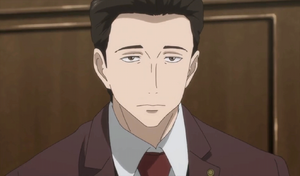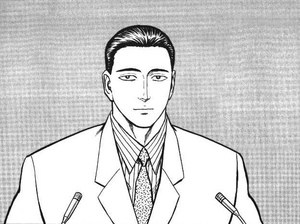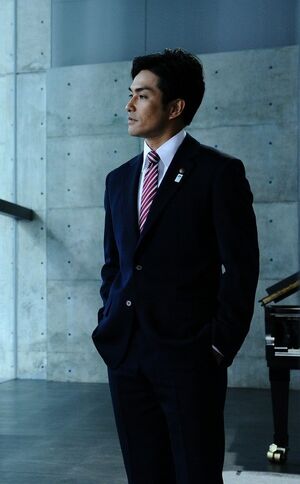| Takeshi Hirokawa | |
|---|---|
|
| |
| Personal statistics | |
| Name | Takeshi Hirokawa |
| Japanese | Hirokawa Takeshi |
| Rōmaji | 広川 剛志 |
| Gender | Male |
| Age | 41 |
| Status | Deceased |
| Species | Human |
| Characteristics | |
| Eye | Brown (anime) Black (manga, live-action) |
| Hair | Brown (anime) Black (manga, live-action) |
| Occupation | Mayor of East Fukuyama City |
| Partner(s) | Reiko Tamura Gotou |
| Series statistics | |
| Anime debut | Episode 9 |
| Manga debut | Chapter 20 |
| Seiyuu | Yutaka Mizushima |
| English Voice | John Gremillion |
| Live Action | Kazuki Kitamura |
| Image Gallery | |
Takeshi Hirokawa (広川 剛志, lit. Hirokawa Takeshi) was the leader of a cabal of Parasites which counts Reiko and Gotou among its members. He was the Mayor of East Fukuyama City, and a human who sympathized with the Parasites.
Appearance[]
Hirokawa was a well-kept man with short hair that was neatly combed back and an average height and build. In the anime he had brown hair and eyes, while in the manga they were black. He was almost always seen in a formal suit and tie.
Personality[]
Hirokawa was a level-headed man, his demeanor usually calm and without expression. This made people mistake him as a parasite. He believed that humans are toxic, and greatly disapproved of how the human race treats the planet and all the other species around them. Being sympathetic with parasites, he truly believed they were the answer to cleansing the planet of humans and assumed his own species as trash.
He is also attentive to the parasites allied with him, asking about Reiko's infant, mediating between them and keeping tabs on the news when they can no longer be contacted.
Similar to the parasites, he displays little expression; the only emotion he strongly shows is rage during his final speech.
Plot[]

|
This article has few or no images. Please help the Kiseijuu Wiki by adding more to the article. |
Hirokawa is first seen alone with Reiko in a dark room, discussing the budding awareness of parasites in human media. In response to Reiko's question of why the parasites exist, he reveals his belief that humanity has become a poison to the Earth and that parasites appeared as the solution.
Offscreen, he and Reiko recruit a group of parasites willing to follow him. The group attempts to accrue political power in order to set up safehouses where they can take their victims, killing and eating them in secret. Hirokawa gains election to the office of mayor in East Fukuyama City, a small town (by Japanese standards) of 500,000 people close to Shinichi's hometown. Hirokawa wins by running on a campaign centered around locally based environmentalism.
Members of the group cross Shinichi's path multiple times after the election, the first one killing Kana Kimishima outside of a safehouse and subsequently being killed by Shinichi. Although they discuss his role in this event and Hideo Shimada's destruction, Hirokawa cedes to Reiko's request that they leave him alive and in her responsibility.
However, after the next parasite is killed within a safehouse the parasite group meets again and he sides with the other parasites advocating that Shinichi be killed. He speaks with Gotou afterwards to request that Gotou take care of Shinichi, but the parasite declines in favor of allowing Miki to test his abilities.
Later, after Kusano and his allies secretly attempt to kill Reiko and fail, and she is shot to death by police the next day, Hirokawa discusses with Gotou (and other parasites in the manga) about the loss of the four parasites and the anti-parasite forces gathering strength against them.
During a confrontation in city hall, the police force wipes out most of their group and kills Hirokawa, discovering that he was never a Parasite, but a human Parasite sympathizer. Gotou crashes into the room afterwards, musing upon him, Reiko and the ending of their plans.
Trivia[]
- The name Takeshi means "sturdy, strong" (剛) (take) and "will, ambition" (志) (shi).
- His surname Hirokawa means "wide, broad" (広) (hiro) and "river, stream" (川) (kawa).
- In the original Japanese, the only time the titular Kiseijuu are mentioned is at the end of his speech, implying the title of the work refers to humans. Parasites are instead referred to as "Parasaito" in katakana and occasionally "kiseiseibutsu" (寄生生物), meaning "parasitic lifeforms".
- Hirokawa plays a major role in the Parasyte Reversi spinoff.



